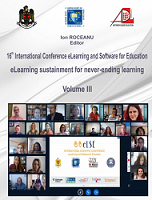EDUCATION 3.0: BLOCKCHAIN-BACKED MOOCS
EDUCATION 3.0: BLOCKCHAIN-BACKED MOOCS
Author(s): Virgil Paraschiveanu, Geomina Richardson, Roxana Voicu-DorobanțuSubject(s): Business Economy / Management, Higher Education , State/Government and Education, ICT Information and Communications Technologies, Distance learning / e-learning, Pedagogy
Published by: Carol I National Defence University Publishing House
Keywords: blockchain; sovereign digital identity; ledgers; MOOC;
Summary/Abstract: MOOCs ability to provide valuable skills and competencies at a fraction of the cost of other educational offers, in a fraction of the time, and from the comfort of one’s own home, has proven to be a promising business reference to digital transformation, as applied in higher education. This paper overviews the impact of blockchain features, such as the trendy self-sovereign identity adding precious disruptive value along MOOCs value chains, especially around content acquisition, digital marketing and monetization, as well as facilitating acquisition and transfer of credentials in a digital trust-focused environment. A sound, trackable and protective digital identity has been long considered a needed asset, whereas the owner of the credentials, either the university, individual or employer has full control over the data that is shared across the educational ecosystem, on a case-by-case basis. The article also aspires at critically observing whether using blockchain tech for courseware aggregation and delivery constitutes a sound business case, as well as a worthy exploration for intrinsic learning motivation and an enhancement to higher education value chain. Secondly, blockchain and the self-sovereign identity offer benefits for the education authoring providers in particular and token-based monetization models for OER education. Blockchain has the potential to disrupt significantly current business models, by facilitating legally binding smart-contracts, helping streamline the credentials' processes, protecting the viability and legitimacy of education records as well as increasing the effectiveness of educational agregators. Reliably easy and quick to transfer credentials are essential for the labor force to be able to swiftly introduce newly acquired skills and competencies to the real business. In the same time, education providers are incentivized by an education governance model that enables better management and sustainability.
Journal: Conference proceedings of »eLearning and Software for Education« (eLSE)
- Issue Year: 16/2020
- Issue No: 03
- Page Range: 82-90
- Page Count: 9
- Language: English

